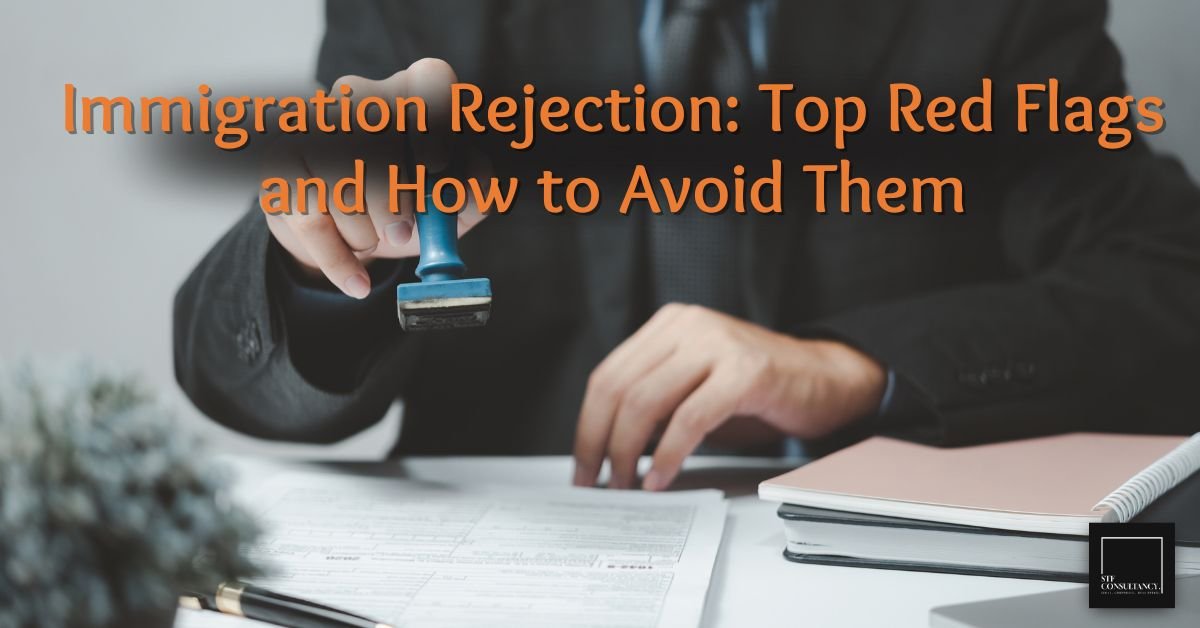The notification arrives, and your heart sinks. Your application for immigration has been rejected. It’s a devastating setback, costing you not only significant time and money but also your dreams for a new future. The path to immigration is complex, and even small, unintentional errors can lead to a denial.
This comprehensive guide is designed to help you navigate this challenging process. We will uncover the most common red flags that lead to immigration rejection and provide actionable, legal strategies to strengthen your application. By understanding what immigration officers are looking for, you can proactively address potential issues and dramatically increase your chances of approval.
Understanding the “Why”: Common Grounds for Immigration Rejection
Before diving into specific red flags, it’s crucial to understand the general principles behind a rejection. Immigration authorities assess every application based on three core pillars: Genuineness, Eligibility, and Admissibility. Failure to satisfy any of these can result in a denial.
Ineligibility for the Chosen Program
This is the most straightforward reason for denial. You simply do not meet the specific criteria for the visa or program you applied for. This could be due to insufficient points (in points-based systems), lack of required work experience, or not meeting the investment threshold for an immigrant investor program.
Failure to Prove Genuine Intent
This is a major area where applications fail. You must convince the officer that your intentions are exactly as stated. For a work visa, this means proving the job is genuine. For a study permit, you must demonstrate a sincere desire to study and that you will leave upon completion.
Issues of Inadmissibility
This category includes factors that make an applicant ineligible to enter the country. Common reasons include:
- Criminal Inadmissibility: A criminal record, even for what seems like a minor offense, can be a significant barrier.
- Health Inadmissibility: Having a medical condition that poses a public health risk or is deemed to place excessive demand on the country’s healthcare system.
- Misrepresentation: Knowingly or unknowingly providing false or misleading information. This is one of the most serious offenses and can lead to a multi-year ban from applying again.
Top 5 Red Flags That Lead to an Immigration Rejection
Now, let’s examine the specific pitfalls that raise red flags for visa officers.
1. Inconsistent or Incomplete Documentation
This is the most common technical reason for denial. Inconsistencies, no matter how small, destroy your credibility.
- The Red Flag: Dates on your application don’t match supporting documents (e.g., employment letters, bank statements). Unexplained gaps in your travel, employment, or personal history. Missing or poorly translated documents.
- The Legal Tip: Create a master checklist of every required document. Cross-reference every date and fact across your entire application package. Ensure all translations are certified and include an affidavit from the translator. Leave no gaps in your history; if you were unemployed for a period, state it clearly and honestly.
2. Insufficient Proof of Funds
Most economic immigration pathways and study permits require you to prove you have enough money to support yourself and any family members upon arrival.
- The Red Flag: A bank statement showing a large, recent deposit with no paper trail. Inability to explain the legitimate source of your funds. The balance barely meets the minimum requirement.
- The Legal Tip: Plan ahead. Build your funds over time. For large deposits (e.g., from the sale of a property or a gift), provide documented proof like a sale deed or a notarized gift deed. Maintain bank statements for several months to show a stable financial history.
3. A Weak Statement of Purpose or Travel History
Your personal statement and passport are your story. Officers look for coherence and credibility.
- The Red Flag: A generic, copy-pasted Statement of Purpose (SOP) that doesn’t convincingly link your past experience to your future goals in the new country. A passport with no travel history, or a history of overstaying visas in other countries.
- The Legal Tip: Your SOP should be unique and compelling. Explain why you chose this specific country, university, or program. Connect your past achievements to your future plans. If you have a complex travel history, address it proactively and honestly.
4. Family Ties (Both Weak and Strong)
This is a nuanced but critical area, especially for temporary visas.
- The Red Flag (Weak Ties): For temporary visas, if you have minimal family, employment, or property ties to your home country, the officer may believe you have no intention of leaving the host country after your visa expires.
- The Red Flag (Strong Ties Elsewhere): For permanent residency, if you have a spouse or children who are not included in the application, it may raise questions about your intention to permanently settle.
- The Legal Tip: For temporary visas, provide strong evidence of your need to return home (e.g., a job letter confirming leave, property deeds, family dependencies). For permanent applications, always declare all family members, even if they are not accompanying you.
5. Misrepresentation (Section 40(1)(a) – Canada Example)
This is the most severe red flag. Misrepresentation is not just lying; it can include omitting information that is material to your application.
- The Red Flag: Failing to declare a previous visa refusal from another country. Not disclosing a family member. Providing a fraudulent job letter or educational certificate.
- The Legal Tip: Absolute honesty is non-negotiable. Declare every visa refusal, every family member, and every detail, even if you think it might be negative. The consequence of being found to have misrepresented yourself—a 5-year ban from Canada, for example—is far worse than the consequence of disclosing a previous refusal.
Read More: 5 Immigration Scams in Pak & UAE
Proactive Legal Strategies to Strengthen Your Application
Avoiding red flags is only half the battle. A successful application actively demonstrates your strength as a candidate.
Choose the Right Immigration Program
Don’t force yourself into a program where you barely qualify. Research extensively to find the most successful immigration programs for your profile. For skilled workers, this might be a points-based system like Canada’s Express Entry or Australia’s SkillSelect. For entrepreneurs, it could be the immigrant investor program of a specific country. Selecting the right pathway from the start is the most critical decision you will make.
Meticulous Document Preparation
Treat your application like a legal brief. Every document should be pristine, organized, and easy for an officer to verify. Use tabs, a table of contents, and clear labeling. This level of organization signals professionalism and respect for the process.
Build a Strong, Verifiable Profile
- Work Experience: Ensure your employment letters are on company letterhead, signed, and include detailed job duties, your title, salary, and hours worked.
- Funds: As mentioned, build your financial profile over time. Avoid large, unexplained transactions.
- Language Proficiency: Exceed the minimum language test scores. High scores not only give you more points but also demonstrate your ability to integrate successfully.
When to Seek Professional Legal Help
While many applications can be done independently, certain situations demand expert guidance. You should strongly consider hiring an accredited immigration lawyer or consultant if:
- You have a prior visa rejection.
- You or a family member have a criminal or medical issue.
- Your case is complex (e.g., you are a business owner with complicated financial records).
- You are applying for a high-stakes program like a citizenship by investment program.
A professional can help you frame your narrative, ensure compliance, and prepare a waiver or legal submission if necessary.
Exploring Your Options: A Look at Successful Pathways
If you are concerned about eligibility in one stream, it’s wise to research alternatives. Many countries offer a list of countries with citizenship by investment or residency-by-investment programs for qualified individuals.
Other STF immigration programs (Skilled Worker, Trade, Family) may be a better fit depending on your occupation and background. Thorough research into the best immigration programs for your unique situation is the foundation of a successful application.
Conclusion: Your Future is Worth the Diligence
An immigration rejection is a difficult experience, but it is often preventable. The key lies in meticulous preparation, brutal honesty, and a deep understanding of the requirements. By recognizing the red flags—inconsistent documents, insufficient funds, weak ties, and the grave risk of misrepresentation—you can take proactive steps to avoid them.
Treat your application with the seriousness it deserves. Double-check every detail, tell your story with clarity and confidence, and don’t hesitate to seek expert advice for complex situations. Your dream of immigrating is achievable with the right strategy and careful execution.
Ready to ensure your application is successful? Schedule a free consultation with our experienced immigration experts today. We’ll review your profile and help you build the strongest possible case for your new beginning.
Frequently Asked Questions (FAQs)
Q1: If my application is rejected, can I appeal the decision?
Yes, many countries have an appeal or judicial review process. The specific steps and timelines vary greatly by country and visa type. It is crucial to act quickly and, in most cases, seek legal counsel to navigate the appeals process effectively.
Q2: How long does a visa rejection stay on my record?
A visa refusal is permanently recorded in the immigration system of that country. However, this does not mean you can never apply again. The critical factor is how you address the refusal in any future application. You must declare it and overcome the reasons for the initial denial.
Q3: Will a minor criminal offense from years ago definitely lead to rejection?
Not necessarily. Many immigration systems allow for “criminal rehabilitation” or the submission of a waiver for inadmissibility. The outcome depends on the nature of the offense, how much time has passed, and your behavior since. This is a complex area where legal advice is highly recommended.
Q4: What is the single biggest mistake people make in their applications?
The biggest mistake is misrepresentation by omission. People often fail to declare a previous visa refusal or a family member, thinking it will harm their chances. In reality, the act of hiding this information is far more damaging than the information itself and can lead to a multi-year ban.
Q5: Are “citizenship by investment” programs easier and guaranteed?
No, they are not guaranteed. While these programs have clearer financial requirements, they still involve rigorous background checks, source of funds verification, and due diligence. Any misrepresentation or inability to prove the legitimate source of your funds will lead to rejection, often with non-refundable fees.





